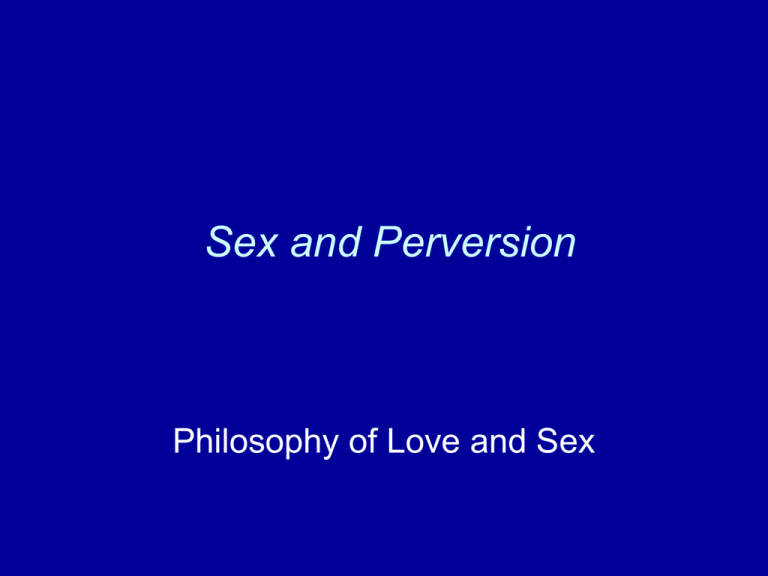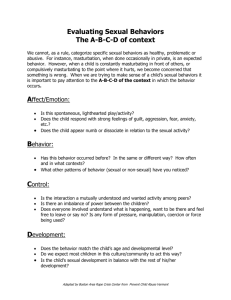
Sex and Perversion
Philosophy of Love and Sex
Harms and benefits of
pornography?
• (But, first, can we recognize porn?)
Apotemnophilia
• A desire to have one’s limb removed, because:
– one has a sexual attraction to amputees, or
– one has a sexual attraction to being an amputee, or
– one believes the body part isn’t really a part of oneself.
• Relatively uncontroversial claim: If psychotherapy is just
as effect in terms of all outcomes as surgery,
psychotherapy should be preferred.
• This claim seems to carry the assumption that there is a
right way and a wrong way for body and mind to
function.
• The question about perversion is what, if any, are the
wrong ways for the body and mind to function sexually.
Goldman
•
•
•
Sexual activity = activity that tends to
fulfill sexual desire
Sexual desire = a desire for physical
contact and its pleasures
Perverted sexual act = a sexual act not
typically engaged in
What is sex?
•
When Bill Clinton was asked in court if he had sex with Monica Lewinsky,
the lawyers who asked him gave this definition:
For the purposes of this deposition, a person engages in sexual relations when
the person knowingly engages in or causes:
1. Contact with the genitalia, anus, groin, breast, inner thigh, or buttocks of any
person with an intent to arouse or gratify the sexual desire of any person;
2. Contact between any part of the person's body or an object and the genitals or
anus of another person; or
3. Contact between the genitals or anus of the person and any part of another
person's body.
Contact means intentional touching, either directly or through clothing.
•
•
•
•
By 2 or 3, a gynecologist or a proctologist typically has sexual relations with
a patient in the normal course of medical practice.
Might try to remove 2 and 3. But then a couple who have sex for purely
reproductive purposes doesn’t count as engaging in sexual relations.
Suggestion: Aristotle’s notion of focal meaning. Health focally is the good
functioning of the body. But analogically we can talk of healthy food (food
that promotes good functioning of the body) and healthy urine (urine that is
a sign of the good functioning of the body).
Likewise, we might define sex in the focal sense as mating or intercourse,
and then say that other things are “sex” in an analogical sense, e.g., by
producing a similar pleasure.
Nagel
• In normal sexual desire, x is aroused by
y’s being aroused by x’s being aroused by
y, and y is aroused by x’s being aroused
by y’s being aroused by x.
• Perverted sexual desire is sexual desire
that falls short of this.
Singer
• Traditionally, Christian culture forbade
homosexual activity, oral sex,
masturbation, contraception and bestiality.
• Currently, the culture accepts all of these
except bestiality.
• This is inconsistent: One should either
reject them all or accept them all. (Singer
accepts them all.)
Freud
• Perverted sex is sex that is not of a kind
capable of reproduction.
• Scruton’s criticism: too physical.
• [But: human reproduction has an
interpersonal significance. –ARP]
Scruton on sexual desire
• Sexual desire is essentially desire for a person: “the marshalling and
directing of animal urges towards an interpersonal aim”.
• Sex is bound up with our embodiment.
• You can recognize people by their sexual parts, but not in their
sexual parts, at least not the way one recognizes them in their face:
the face exhibits the person, while the sexual parts do not. “In true
erotic art it is usually the face and not the sexual organ that provides
the focus of attention.”
• You can recognize people by their sexual parts, but not in their
sexual parts. But you can recognize people in their faces. “In true
erotic art it is usually the face and not the sexual organ that provides
the focus of attention.”
• Modesty is a necessary condition for sexual desire. Immodest
desire “rides roughshod over the reticence of others, and treats
every new object as an equivalent of the last”—this is lust.
Scruton on perversion
• Bestiality and necrophilia: a safe realm, one far from
interpersonal things. The body is treated as just flesh,
the way a piglet might scratch at a stone, rather than as
something personal, something significant, something
with a certain sacredness.
• Homosexuality somewhat loses sight of the mystery of
the other person, since that mystery comes in part from
the difference between the sexes. (Compare incest.)
• Masturbation:
– With representation: obscene way of satisfying one’s desire
without another. [Also: It typically sexually uses another without
consent. -ARP]
– Without representation: escape from the interersonal.
A distinction about desire
• A desire can be fulfilled: that which is desired
can be obtained. One may or may not know that
this happened.
• A desire can be quelled: the desire can be
made to go away.
• Usually, fulfilling a desire quells it.
• When a desire is quelled without being fulfilled, it
often comes back strengthened. (Eating sand to
fill one’s stomach; masturbation.)
Mary Geach
•
•
•
•
•
•
•
•
•
A sexual act that is not a marital act is a severed limb. Sexual acts receive
their meaning from the good of marriage.
Sex is not like eating, because a single sexual act is of deep significance
(need only one act to reproduce).
A respect for marriage is built into the virtuous person’s life.
It is important to have the possibility for friendships where sex is out of the
question. And that’s same-sex friendship.
The institution of paternity requires female chastity.
If consent is the rule, there must be a precise answers to the questions of
what is consented to and what expectations there are with respect to the
consequences.
Lust makes it seem like our whole future depends on this relationship. –
And that’s because lust is a distortion of something directed at marriage.
The bad stuff in society around us is evidence for the importance of a virtue
directed at marital friendship.
Sexual acts aimed at reproduction but unsuccessful—just like gravity.






